Background
Chalmers, David John was born on April 20, 1966, in Sydney, New South Wales, Australia. He is a son of John Phillip Chalmers and Julie Ann Kierath. He has an older sister and three younger brothers.

1974
David Chalmers with Jenny Brack, Mike, and Helen.
1975
Melbourne, Australia
David Chalmers with Matt, Mike, John, Helen, Anna Funder.
1981
David Chalmers
David Chalmers
David Chalmers
David Chalmers
David Chalmers
David Chalmers
David Chalmers
David Chalmers
David Chalmers
David Chalmers
David Chalmers
David Chalmers
David Chalmers
David Chalmers
David Chalmers
David Chalmers
Young David Chalmers.






































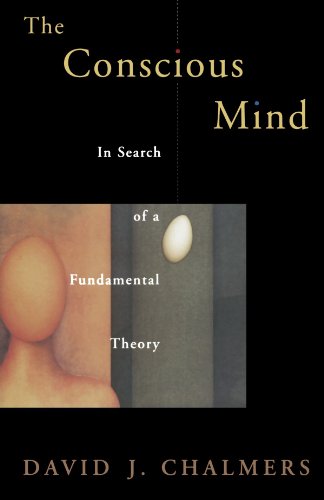
(Writing in a rigorous, thought-provoking style, the autho...)
Writing in a rigorous, thought-provoking style, the author takes us on a far-reaching tour through the philosophical ramifications of consciousness. Chalmers convincingly reveals how contemporary cognitive science and neurobiology have failed to explain how and why mental events emerge from physiological occurrences in the brain. He proposes instead that conscious experience must be understood in an entirely new light - as an irreducible entity (similar to such physical properties as time, mass, and space) that exists at a fundamental level and cannot be understood as the sum of its parts. And after suggesting some intriguing possibilities about the structure and laws of conscious experience, he details how his unique reinterpretation of the mind could be the focus of new science.
http://www.amazon.com/gp/product/0195117891/?tag=2022091-20
1996
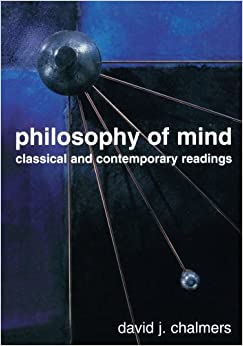
(The most comprehensive collection of its kind, the book i...)
The most comprehensive collection of its kind, the book includes sixty-three selections that range from the classical contributions of Descartes to the leading edge of contemporary debates. Extensive sections cover foundational issues, the nature of consciousness, and the nature of mental content. Three of the selections are published here for the first time, while many other articles have been revised especially for this volume. Each section opens with an introduction by the editor.
https://www.amazon.com/Philosophy-Mind-Classical-Contemporary-Readings/dp/019514581X/ref=sr_1_3?dchild=1&keywords=david+chalmers&qid=1601386674&sr=8-3
2002
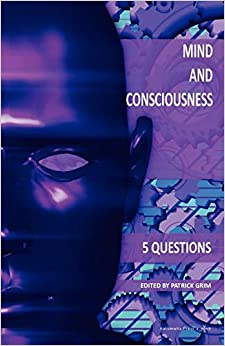
(Debates concerning the nature of mind and consciousness a...)
Debates concerning the nature of mind and consciousness are active and ongoing, with implications for philosophy, psychology, artificial intelligence, and the neurosciences. This book collects interviews with some of the foremost philosophers of mind, focusing on open questions, promising projects, and their own intellectual histories. The result is a rich glimpse of the contemporary debate through some of the people who make it what it is. Interviews with Lynne Rudder Baker, David Chalmers, Daniel Dennett, Fred Dretske, Owen Flanagan, Samuel Guttenplan, Valerie Gray Hardcastle, John Heil, Terence Horgan, Douglas Hofstadter, Frank Jackson, Jaegwon Kim, William Lycan, Alva Noë, Hilary Putnam, David Rosenthal, John Searle, Steven Stich, Galen Strawson, Michael Tye.
https://www.amazon.com/Mind-Consciousness-Questions-David-Chalmers/dp/8792130100/ref=sr_1_5?dchild=1&keywords=david+chalmers&qid=1601386674&sr=8-5
2009
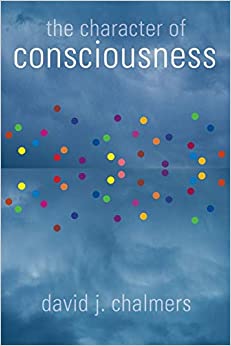
(In this sequel to his groundbreaking and controversial Th...)
In this sequel to his groundbreaking and controversial The Conscious Mind, David Chalmers develops a unified framework that addresses these questions and many others. Starting with a statement of the "hard problem" of consciousness, Chalmers builds a positive framework for the science of consciousness and a nonreductive vision of the metaphysics of consciousness. He replies to many critics of The Conscious Mind, and then develops a positive theory in new directions. The book includes original accounts of how we think and know about consciousness, of the unity of consciousness, and of how consciousness relates to the external world.
https://www.amazon.com/Character-Consciousness-Philosophy-Mind/dp/0195311116/ref=sr_1_2?dchild=1&keywords=david+chalmers&qid=1601386674&sr=8-2
2010
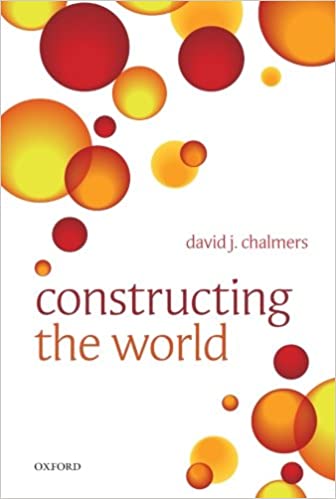
(David J. Chalmers constructs a highly ambitious and origi...)
David J. Chalmers constructs a highly ambitious and original picture of the world, from a few basic elements. He develops and extends Rudolf Carnap's attempt to do the same in Der Logische Aufbau Der Welt (1928). Carnap gave a blueprint for describing the entire world using a limited vocabulary so that all truths about the world could be derived from that description - but his Aufbau is often seen as a noble failure. Based on Chalmers's 2010 John Locke lectures, Constructing the World opens up debate on central areas of philosophy including philosophy of language, consciousness, knowledge, and reality.
https://www.amazon.com/Constructing-World-David-J-Chalmers/dp/019960858X/ref=sr_1_4?dchild=1&keywords=david+chalmers&qid=1601386674&sr=8-4
2012
philosopher cognitive scientist
Chalmers, David John was born on April 20, 1966, in Sydney, New South Wales, Australia. He is a son of John Phillip Chalmers and Julie Ann Kierath. He has an older sister and three younger brothers.
Chalmers went to Unley High School. In his childhood, David was fascinated by science and math. He loved to read and always with his head in a book. He was really into math competitions and math summer schools and saw himself becoming a mathematician.
In 1983 Chalmers enrolled at the University of Adelaide, and in 1986 he earned there an Honors Degree of Bachelor of Science, in Pure Mathematics. The next year he traveled to the United Kingdom to study mathematics at the University of Oxford. From 1989 to 1993 he attended Indiana University in the United States, where he obtained a Doctor of Philosophy degree in 1993 in philosophy and cognitive science, working in Doug Hofstadter’s Center for Research on Concepts and Cognition.
David Chalmers started his career in 1989 as a research assistant at the Center for Research on Concepts and Cognition, at Indiana University. Then he worked at Washington University in St. Louis from 1993-1995 and at the University of California-Santa Cruz from 1995-1998.
David Chalmers also held a position as a professor in the Department of Philosophy and as a director of the Center for Consciousness Studies at the University of Arizona from 1999 to 2004.
In 2004 he started working at the Australian National University as a professor, and a director of Centre for Consciousness at Australian National University. He worked there until 2017.
Chalmers accepted a part-time professorship at New York University in 2009 and then a full-time professorship at the same university in 2012.
In 2018 he also became an Honorary professor of philosophy at Australian National University.
His 1996 book The Conscious Mind is considered a seminal work on consciousness. His numerous papers and books have had great influence in the realms of cognitive science, philosophy of the mind, and philosophy of language. In 2013 he was elected a Fellow of the American Academy of Arts & Sciences.
David John Chalmers' numerous papers and books have had great influence in the realms of cognitive science, philosophy of the mind, and philosophy of language. In 2013 he was elected a Fellow of the American Academy of Arts & Sciences.
In 2018 he was awarded an Honorary Doctor degree by Australian National University.
David John Chalmers has been listed as a noteworthy philosophy educator by Marquis Who's Who.
(The most comprehensive collection of its kind, the book i...)
2002(Debates concerning the nature of mind and consciousness a...)
2009(In this sequel to his groundbreaking and controversial Th...)
2010(Writing in a rigorous, thought-provoking style, the autho...)
1996(David J. Chalmers constructs a highly ambitious and origi...)
2012Chalmers is not religious. In 2011 David Chalmers in an interview on "Encounter" on Australian ABC National said: "Now I have to say I'm a complete atheist. I have no religious views myself and no spiritual views, except very watered down humanistic spiritual views. And consciousness is just a fact of life. It's a natural fact of life."
David Chalmers is a philosopher of mind whose characterization of consciousness as "the hard problem" has set a very high bar for understanding the mind. He says that "the problem of quantum mechanics is almost as hard as the problem of consciousness."
Chalmers placed the "hard problem" of consciousness firmly on the philosophical map. The hard problem of consciousness is the problem of explaining why any physical state is conscious rather than nonconscious. It is the problem of explaining why there is "something it is like" for a subject in conscious experience, why conscious mental states "light up" and directly appear to the subject. He famously challenges materialist conceptions of mind, arguing for an "explanatory gap" between our brains' physical properties and our minds' qualia. Elsewhere he has championed the notion of the "extended mind," which argues that the mind is not confined to skin or skull, but plausibly may extend beyond them.
For the past decades, he has repeatedly asked two questions, "What is the place of consciousness in nature?," and "What is the reality behind quantum mechanics?"
That these questions are connected comes from many scientists who speculated that the mind of the conscious observer is the cause of the collapse of the wave function. But wave functions have been collapsing long before physicists and human beings existed.
Physicists like John von Neumann and Eugene Wigner and many other "interpreters" of quantum mechanics argue that wave-function collapse is evidence for a cosmic consciousness or mind of God at work creating the universe. Chalmers sees it for evidence of panpsychism, that consciousness is a fundamental, non-material component of the universe.
Chalmers describes his position as a naturalistic dualism, also known as physicalism. He doubts that consciousness can be explained by physical theories because consciousness is itself not physical.
Quotations:
"Conscious experience is at once the most familiar thing in the world and the most mysterious."
"Consciousness poses the most baffling problems in the science of the mind. There is nothing that we know more intimately than conscious experience, but there is nothing that is harder to explain."
"I am an optimist about consciousness: I think that we will eventually have a theory of it, and in this book I look for one. But consciousness is not just business as usual; if we are to make progress, the first thing we must do is face up to the things that make the problem so difficult. Then we can move forward toward a theory, without blinkers and with a good idea of the task at hand."
"Consciousness is the biggest mystery. It may be the largest outstanding obstacle in our quest for a scientific understanding of the universe."
"Consciousness can be startlingly intense. It is the most vivid of phenomena; nothing is more real to us. But it can be frustratingly diaphanous: in talking about conscious experience, it is notoriously difficult to pin down the subject matter."
"In developing my account of consciousness, I have tried to obey a number of constraints. The first and most important is to take consciousness seriously. The easiest way to develop a "theory" of consciousness is to deny its existence or to redefine the phenomenon in need of explanation as something it is not. This usually leads to an elegant theory, but the problem does not go away."
"Why should physical processing give rise to a rich inner life at all? It seems objectively unreasonable that it should, and yet it does."
Here are some of the organizations David Chalmers is involved with: The PhilPapers Foundation, Association for the Scientific Study of Consciousness, Center for Mind, Brain, and Consciousness at New York University, Centre for Consciousness at Australian National University, Center for Consciousness Studies at the University of Arizona, Stanford Encyclopedia of Philosophy, Oxford University Press, Australasian Association of Philosophy, Foundational Questions Institute.
In 2013, he was elected a Fellow of the American Academy of Arts and Sciences. He is also a member of the Society for Philosophy and Psychology.

American Academy of Arts & Sciences , United States
2013
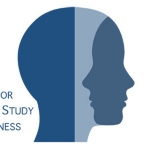
Association for the Scientific Study of Consciousness
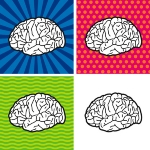
Society for Philosophy and Psychology

The PhilPapers Foundation
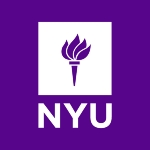
Center for Mind, Brain, and Consciousness at New York University
Centre for Consciousness at Australian National University

Center for Consciousness Studies at the University of Arizona
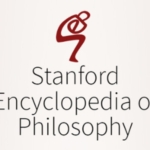
Stanford Encyclopedia of Philosophy
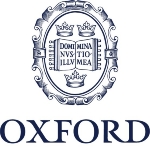
Oxford University Press

Australasian Association of Philosophy
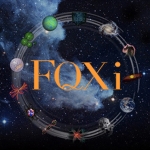
Foundational Questions Institute
David Chalmers likes to wear a leather jacket, he owns six or seven of them.
His favorite movies are Brazil, Groundhog Day, Lantana, Local Hero, Mulholland Drive, Rabbit-Proof Fence, and Thelma and Louise.
Physical Characteristics: As a child David Chalmers was a music-color synaesthete - songs had colors for him.
David Chalmers lives in New York with his partner Claudia Passos Ferreira, a philosopher and psychologist from Rio de Janeiro who teaches at the New York University's Center for Bioethics.
